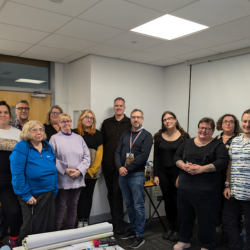-
Study
-
Undergraduate
- Search for a Course
- Undergraduate Open Day & Events
- Application Guides
- Northumbria University UCAS Exhibitions
- Foundation Years
- Undergraduate Fees & Funding
- School & College Outreach
- Continuing Professional Development
-
Postgraduate
- Postgraduate Study Degree
- Postgraduate Research Degrees
- Postgraduate Open Days and Events
- Postgraduate Fees & Funding
- Flexible Learning
- Thinking about a Masters?
- Continuing Professional Development
- Change Direction
-
Student Life
- The Hub - Student Blog
- Accommodation
- Life in Newcastle
- Support for Students
- Careers
- Information for Parents
- Students' Union
- Northumbria Sport
- Be Part of It
-
-
International
International
Northumbria’s global footprint touches every continent across the world, through our global partnerships across 17 institutions in 10 countries, to our 277,000 strong alumni community and 150 recruitment partners – we prepare our students for the challenges of tomorrow. Discover more about how to join Northumbria’s global family or our partnerships.
View our Global Footprint-
Applying to Northumbria
- European Union
- Our London Campus
- Northumbria Pathway
- International Events
- Entry Requirements and Country Representatives
- Regional Offices
-
Northumbria Language Centre
- Faculty Requirements
- Acceptable English Requirements
- Pre-sessional English Language and Study Skills
- Academic Language Skills Programmes (ALS)
-
International Fees, Funding & Scholarships
- International Undergraduate Fees
- International Undergraduate Funding
- International Masters Fees
- International Masters Funding
- International Postgraduate Research Fees
- International Postgraduate Research Funding
- International Money Matters
-
Life at Northumbria
- International student support
- Careers
-
International Mobility
- Current Northumbria Students
- Incoming Exchange Students
-
-
Business
Business
The world is changing faster than ever before. The future is there to be won by organisations who find ways to turn today's possibilities into tomorrows competitive edge. In a connected world, collaboration can be the key to success.
More on our Business Services -
Research
Research
Northumbria is a research-rich, business-focused, professional university with a global reputation for academic quality. We conduct ground-breaking research that is responsive to the science & technology, health & well being, economic and social and arts & cultural needs for the communities
Discover more about our Research -
About Us
-
About Northumbria
- Our Strategy
- Our Staff
- Place and Partnerships
- Student Profiles
- Alumni Profiles
- Leadership & Governance
- Academic Departments
- University Services
- History of Northumbria
- Contact us
- Online Shop
-
-
Alumni
Alumni
Northumbria University is renowned for the calibre of its business-ready graduates. Our alumni network has over 244,000 graduates based in 178 countries worldwide in a range of sectors, our alumni are making a real impact on the world.
Our Alumni - Work For Us
What will I learn on this module?
In this module you will develop knowledge and critical understanding of three types of narrative practice used in guidance and counselling: personal construct psychology, existential therapy and narrative therapy. You will develop understanding of the ways in which the lives of individuals, families and communities are shaped by the stories they tell about themselves, and of ways in which identities can be enriched and strengthened or hurt and diminished depending upon the sorts of stories that are told and who is recognised as having the right to tell stories. In exploring these three types of therapeutic intervention, you will gain insight into how different types of listening conversations can be used as opportunities to allow people to think about how damaging stories can be rejected, and different meanings and preferred storylines can lead to more positive, accepting outcomes. You will gain insight into the view that the person is never the problem, but that the problem is the problem: and find creative ways of working with people in to support them to think differently about problems. As well as learning about the theoretical bases of each of these approaches, you will participate in workshops and seminars where you will have the opportunity to begin to put them into practice. This may involve working in situations where you will consider ideas about subjects including loss, bereavement, death, modern power, or where you will learn about counselling individuals, couples, family groups and communities.
How will I learn on this module?
Teaching and learning strategies for this module will include lectures and seminars in which the main concepts and ideas will be outlined. A key part of the module will involve facilitated group discussions where you will explore key concepts in more depth and draw out individual and collective analysis. Lectures will involve an emphasis on developing an understanding of the theory, while within seminars you will start to relate theory to practice. Engagement with directed independent study tasks will be required, as well as working in informal groups to present your ideas. Online forums and discussion groups will also provide opportunities to enhance your learning.
How will I be supported academically on this module?
As well as a series of formal lectures in which module content will be delivered, lecturers will facilitate seminar groups to support academic development. You will have access to lecturers at specifically designated times via online forums; email; group tutorials and one to one meetings. Group tutorials will provide preparation for formative and summative assessment, and written and verbal feedback will be provided to identify aspects of your strengths and also aspects which require development. Contact details for all module tutors are available in the module handbook and via the eLP. Guidance tutors will also meet with you regularly to provide both academic and pastoral support.
What will I be expected to read on this module?
All modules at Northumbria include a range of reading materials that students are expected to engage with. Online reading lists (provided after enrolment) give you access to your reading material for your modules. The Library works in partnership with your module tutors to ensure you have access to the material that you need.
What will I be expected to achieve?
Knowledge & Understanding:
1. You will be able to critically discuss the principles of personal construct psychology, existential therapy and narrative therapy
2. You will have begun to apply the skills and understanding involved in personal construct psychology, existential therapy and narrative therapy in classroom exercises
Intellectual / Professional skills & abilities:
3. You will be able to critically evaluate different theoretical perspectives on narratives and apply knowledge to counselling practice when working with individuals, couples, families and communities
Personal Values Attributes (Global / Cultural awareness, Ethics, Curiosity) (PVA):
4. You will develop the ability to critically reflect on personal constructs and narratives that have shaped your personal story and on the way your understanding can be used to support others
5. You will develop the ability to critically reflect on the impact of personal construct psychology, existential therapy and narrative therapy in work with individuals, couples, families and communities in different circumstances
How will I be assessed?
Formative
You will work in study groups to prepare a presentation in which you will consider how your understanding of personal construct psychology, existential therapy and narrative therapy can inform counselling practice when working with individuals, couples, families and communities
Summative Assessment is in two parts:
a) You will produce a reflective diary (video or written, 3000 words) reflecting on module content, reviewing academic literature, and exploring the ways key personal constructs and narratives have shaped your outlook on life; as well as what factors have caused these personal constructs and narratives to change and develop. (MLO 1,2)
and
b) You will produce a 1000 word summary
of your reflective diary, drawing on insights developed in this module
(MLO 3,4,5)
Pre-requisite(s)
N/A
Co-requisite(s)
N/A
Module abstract
You will develop knowledge and critical understanding of three types of narrative practice used in guidance and counselling: personal construct psychology, existential therapy and narrative therapy. You will develop understanding of the ways in which the lives of individuals, families and communities are shaped by the stories they tell about themselves, and of ways in which identities can be enriched or diminished depending upon the sorts of stories that are told and who is recognised as having the right to tell stories. You will gain insight into how different types of listening conversations can be used as opportunities to allow people to think about how damaging stories can be rejected, and alternatives can lead to more positive outcomes. As well as learning about the theory behind these approaches, you will participate in workshops and seminars where you will have the opportunity to begin to put them into practice.
Course info
Credits 20
Level of Study Undergraduate
Mode of Study 18 months Full Time
Location Singapore
City Singapore
Start November or May
All information is accurate at the time of sharing.
Full time Courses are primarily delivered via on-campus face to face learning but could include elements of online learning. Most courses run as planned and as promoted on our website and via our marketing materials, but if there are any substantial changes (as determined by the Competition and Markets Authority) to a course or there is the potential that course may be withdrawn, we will notify all affected applicants as soon as possible with advice and guidance regarding their options. It is also important to be aware that optional modules listed on course pages may be subject to change depending on uptake numbers each year.
Contact time is subject to increase or decrease in line with possible restrictions imposed by the government or the University in the interest of maintaining the health and safety and wellbeing of students, staff, and visitors if this is deemed necessary in future.
Useful Links
Find out about our distinctive approach at
www.northumbria.ac.uk/exp
Admissions Terms and Conditions
northumbria.ac.uk/terms
Fees and Funding
northumbria.ac.uk/fees
Admissions Policy
northumbria.ac.uk/adpolicy
Admissions Complaints Policy
northumbria.ac.uk/complaints














